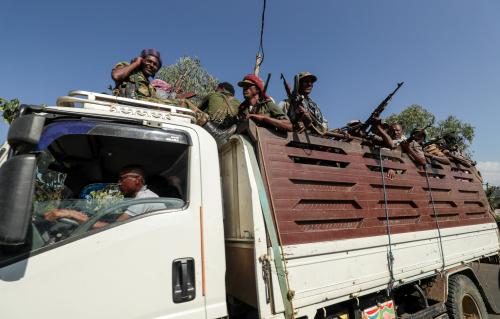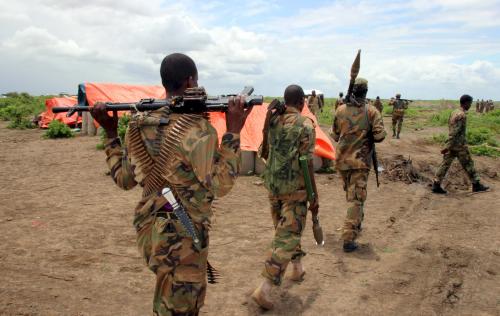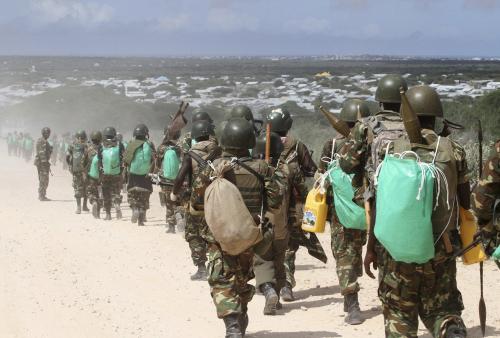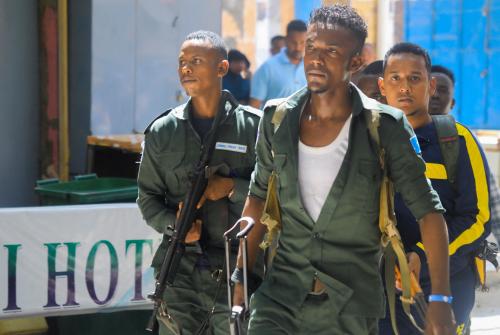Over the last two years, writes Vanda Felbab-Brown, several kinds of conflicts have been brewing and intensifying in Puntland, Somalia, allowing the al-Qaida-aligned al-Shabab and its rival splinter Islamic State in Somalia faction to mount increasingly prominent operations. She argues that Puntland must develop the wherewithal to address the local grievances and build inclusive, equitable, and accountable local governance, or its problems are only likely to grow. This piece originally appeared in Foreign Affairs.
On June 8, the Somalian terrorist group al-Shabab overran a military base in Puntland’s town of Af Urur, killing between 38 and 61 soldiers (with the government of Puntland reporting the lower number and al-Shabab the higher, as is often the case) and injuring others. The assault came days after the government of Puntland, in Somalia’s northeast, sentenced members of al-Shabab to death. The militants had been captured on April 26 as they tried to carry out a large bomb attack in Bosaso, Puntland’s key commercial hub and a crucial port in the region.
Over the last two years, several kinds of conflicts have been brewing and intensifying in Puntland, allowing the al-Qaida-aligned al-Shabab and its rival splinter Islamic State in Somalia (ISS) faction to mount increasingly prominent operations. In the wake of the Af Urur attack, Puntland’s government has called on both the international community and the federal government in Mogadishu to help rid the region of jihadists.
The attack reveals far less about al-Shabab’s persisting strength than about the cauldron of problems stirring in Puntland, a semiautonomous region of Somalia now on its way to formal statehood under the country’s emerging federalism, but still very much defining its power visàvis Mogadishu. In addition to the jihadist threats, Puntland is again facing a return of piracy, and its clan rivalries have intensified. It also has to deal with a wideranging assortment of armed actors, such as antipiracy militias and clan militias, both of which are deeply and explosively linked to clan politics and whose loyalties vary. And, as in other parts of Somalia, Puntland has been badly hit by a severe drought, bringing the region to the edge of famine.
MILITANCY ON THE RISE
Even as members of the African Union Mission in Somalia (AMISOM)—in the country since 2009 to suppress al-Shabab and train and build Somali national security forces—talk of pulling out before the mission is set to formally end in 2020, al-Shabab is far from defeated. Some of the talk of withdrawal by AMISOM members may simply be an attempt to obtain higher payments from the United States and western European states, which are bankrolling the African Union’s military effort in the country. But the withdrawals that have already taken place, most importantly by Ethiopian troops from Somalia’s Gedo region, reveal large security vulnerabilities. Neither Somali forces nor local militias were able to fill the void the withdrawal created, and al-Shabab rapidly took over the vacated areas.
In other parts of southern and central Somalia, including in the capital, Mogadishu, al-Shabab bomb attacks go off every few days. The frequency of these attacks—on police and military stations, governmental compounds, politicians’ convoys, and ordinary Somalis’ lands and livelihoods—has increased over the past year. Rarely is al-Shabab able to hold towns for long, but it controls many a road in Somalia and often rules the nights, even in large towns such as Baidoa and Beledweyne.
Making matters worse, the federal government in Mogadishu has no national forces to spare for Puntland. Its 11,000 poorly trained, paid, and equipped troops are badly overstretched in central and southern Somalia. And despite Puntland’s exhortations in the wake of the Af Urur attack, it is not clear that its government would really want a federal security force in the state because of its potential to interfere in local elections and influence regional politics on Mogadishu’s behalf.
A JIHADIST-PIRATE ALLIANCE?
Al-Shabab first established a presence in Puntland several years ago, after AMISOM operations pushed it from central Somalia into the region’s Galgala hills, some 60 miles south of Bosaso. Although it was on the run at the time, the jihadist group has remained entrenched there ever since, and it regularly mounts attacks from the hills. U.S. air strikes have failed to dislodge the group.
Neither has the Puntland Maritime Police Force (PMPF), a coast guard militia, been able to root out al-Shabab. Originally designed to fight Puntland’s pirates, the force has received secret funding from the United Arab Emirates and training involving mercenaries linked to South Africa’s apartheid-era government and companies connected to Erik Prince, the owner of the private security firm formerly known as Blackwater. After piracy dropped off in 2012 as a result of intense international naval patrolling and better protection measures on ships, however, the PMPF reinvented itself as an allpurpose force for former Puntland President Abdirahman Farole. The force soon became entangled in a web of explosive patronage alignments, used by political factions associated with Farole ostensibly for protection and allegedly for intimidation of political and clan rivals. It also sought to curry favor with the United States by offering itself as a force ready to counter al-Shabab. With U.S. sponsorship, it mounted several raids into the Galgala hills in 2013 but ultimately failed to drive the jihadists out.
Counterproductively, these failed raids also pushed the terrorist group into a temporary alliance with Puntland pirates. That alliance withered as the pirates’ attacks stopped paying off, but recent developments suggest it could soon revive. With the slacking of ships’ security measures and the increase in the industrial illegal fishing in Somalia’s waters that Somali pirates have traditionally cited to justify their own crimes, the famineinducing drought afflicting Somalia may yet revive the dormant pirates. Should that happen, al-Shabab in Puntland may once again reach out to the pirates to coordinate against their shared PMPF enemy.
For now, however, al-Shabab in general and its Puntland presence in particular are far more preoccupied with its splinter group that declared allegiance to the Islamic State and would like to induce other members to follow. Al-Shabab’s internal security wing has been diligently trying to eliminate any ISS sympathizers, purging leaders that show proISS inclinations.
They have good reason to be worried. In October 2016, 50 ISS fighters seized the port of Qandala on a mountainous coastal strip in the Gulf of Aden. The town is sparsely populated, but it provides the splinter group with access to the gulf and smuggling routes to Yemen, where other ISIS factions operate. That takeover may also put the Somali ISIS in contact with reawakening pirates. What kind of triangular relationship would develop between the pirates and the two jihadist groups under such circumstances and whether it would be violent and conflictual or mainly a tactical cooperation of convenience is still up in the humid, salty coastal air of Somalia.
CLAN RIVALRIES AND FAMINE
In their struggle for dominance, both al-Shabab and ISS have drawn on the tensions and rivalries among Somalia’s clans. Qandala, for example, is the home of ISIS leader Sheikh Abdulqadir Mumin. It also features a clanbased armed group led by the former governor of the Bari region, Abdisamad Mohamed Galan. Although not aligned with ISS or al-Shabab, he has been a fierce critic of Puntland’s government and his militia operates largely independently, sometimes at cross-purposes with or even directly against the government. His semi-rebellious presence and anti-government agitation alienate local clans from the government and distract the Puntland government from going after ISS.
Clan rivalries and regional contestations have also ensnared Puntland’s interim government. In 2015, Somalia’s power devolution and state formation got under way in order to address the historic tensions between Mogadishu and Somalia’s regions, including separatist and semiautonomous regions such as Puntland. The center and the regions have thought over the distribution of power and resources for decades, with Mogadishu’s desire to control often provoking both political infighting and even violent conflict. At that time, largescale conflict broke out among rival clans in the town of Galkayo, historically divided between Puntland and what has become the state of Galmudug. In October 2016, heavy fighting resumed again. The United Arab Emirates, with its extensive if opaque influence in Puntland and Somalia more broadly, tried and failed to broker a peace. Sponsored by Somalia’s federal government, the African Union, the European Union, and the U.N., a ceasefire agreement was signed in November 2016, but tensions remain high and could explode anew. There are also rebellious clans on Puntland’s border with Somaliland. These tensions, along with Galan’s semi-mutinous desire for autonomy, have been preoccupying the Puntland government, reducing its capacity and willingness to focus on al-Shabab and ISS.
In the short term, maintaining security is also crucial for dealing with the region’s terrible drought and food insecurity, which have brought it to the edge of famine. Debilitating southern and central Somalia, the drought has also killed vast numbers of livestock in Puntland, often wiping out more than 90 percent of the livelihoods of Puntland’s pastoralists. In Somalia overall, nearly 6.2 million people—more than half of the population—have been experiencing acute water and food shortages, and almost three million are starving. Some spring rain provided temporary relief, but the crisis is not over—and the international aid community is trying to deal with similar conditions in the Lake Chad region, South Sudan, and Yemen.
Puntland must develop the wherewithal to address the local grievances and build inclusive, equitable, and accountable local governance, or its problems are only likely to grow. It should, for example, be scrupulous in allowing Puntland’s various clans to have equitable access to political power and economic resources. The Puntland government should also endeavor to engage Puntland’s civil society, a robust actor with ontheground reach. Civil society groups not only can channel grievances and priorities of local populations but also can actually implement projects. And it must diligently start developing credible security operations against al-Shabab and ISS, rather than ignoring them in order to battle rival states or rival militias.
Failing to do so would besmirch Puntland’s reputation as a bastion of stability within a troubled country. More important, it could jeopardize hundreds of thousands of lives. Now is the time for the regional government to prove that it will not allow insecurity to undermine international relief efforts.
The Brookings Institution is committed to quality, independence, and impact.
We are supported by a diverse array of funders. In line with our values and policies, each Brookings publication represents the sole views of its author(s).










Commentary
Puntland’s problems
It's not just al-Shabab that threatens Somalia's stability
June 19, 2017